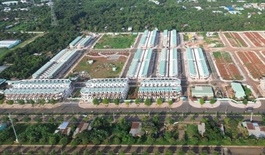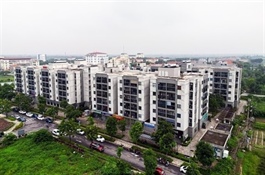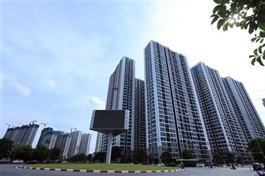Short-term real estate issues remain
Short-term real estate issues remain
Real estate businesses are hoping to take advantage of revised laws and tap into capital flow for the market with a clear and transparent legal system in the long term.

According to Hoang Huy, director of the Institutional Customer Research Department at Maybank Securities, the current cash flow in the real estate market is showing signs of improvement, albeit slowly, after being disrupted in the past few years.
“Cash flow from business activities has begun to return, and low interest rates also make buyers more confident in disbursement as the government allows projects to resume, and some businesses issue shares and sell assets to reduce debt leverage,” Huy said.
In addition to attracting more credit capital from the end of last year, more positivity from the bond market has helped support the liquidity of businesses, as Decree No.08/2023/ND-CP from March allows debt rescheduling for another two years, as well as debt restructuring support activities from the State Bank of Vietnam (SBV).
“In general, cash flow has returned, albeit slowly, but the worst point of the market is over,” Huy said.
According to Decree 08, if the bond-issuing corporation cannot pay fully and on time bond interests and principals in VND according to the bond issuance plan, the corporation may negotiate with bondholders to pay them upon their maturity.
Meanwhile, credit flow into real estate sector looking positive, according to Nguyen Duc Lenh, deputy director of the SBV’s Ho Chi Minh City branch.
Speaking at the 2024 Finance Real Estate Forum last week in the city, Lenh said that real estate credit growth had shown signs of growing again from January, with the highest increase in April.
“Total outstanding real estate debt in Ho Chi Minh City at the end of April increased by 1.6 per cent compared to the end of last year, of which the majority came from end users buying houses for living, accounting for 68 per cent,” he said. “Bank credit plays an important role in the real estate sector and is currently having positive effects. Accordingly, lower lending interest rates, new policies, and the implementation of new laws have helped overcome existing problems.”
Le Hoang Chau, chairman of Ho Chi Minh City Real Estate Association, said that there were clear signals showing that the real estate market had overcome its most difficult period ever. “The market will begin to recover from the end of 2024, slowly but more stably,” Chau said. “Although there are clear signs of recovery, the market still faces many difficulties, at least in the short term when new regulations will need time before being fully implemented.”
Chau said that capital flow was the most difficult problem for developers, with liquidity second. “Only when buyers decide to buy, can the market recover fundamentally and sustainably,” he said.
He also raised the issue from the borrower’s perspective, when interest rates on new loans are low, but old loans are still high. “Although about 70 per cent of real estate business problems are legal issues, we need more ‘non-credit’ solutions to solve related credit activities,” he added.
Meanwhile, Lenh of the SBV said that when a project has fully completed its legal documents, banks can fully respond and find ways to provide new loans. “As for unlocking the flow of credit capital, the market has currently seen positive changes, but liquidity requires flexibility from developers,” he noted.
Lenh cited credit growth in industrial zones in the first four months of the year were at 9.5 per cent compared to the end of last year, accounting for around $1.85 billion.
“This proves that the self-regulating market is very flexible and smart, and good businesses will be met and supported by credit. Credit institutions are ready to meet business’ capital requirements, as long as the project is eligible,” he said.
Huy from Maybank Securities said solutions to unlock capital flows currently focused mainly on situational solutions, from bond extension negotiations and bank credit. Another solution being promoted is to increase the mobilisation of additional capital to increase equity.
“Listed real estate businesses are planning to issue a record amount of capital. However, not all issuers can be successful,” Huy said.
“Foreign investors expect clearer and more favourable legal mechanisms and corridors, as well as the acceleration of public projects and industry linkages, thereby helping to reduce logistics costs and improve efficiency and competitiveness.”























